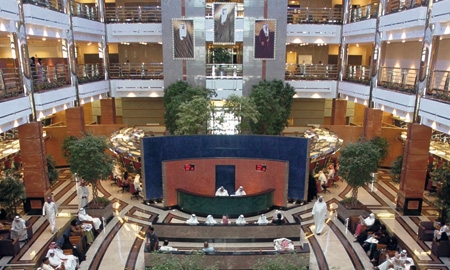An oil-rich nation in an oil-rich region, Kuwait boasts one of the most comprehensive welfare systems in the world. Based on the principle of sharing the income from the nation’s highly demanded natural resources with its people, the system effectively guarantees a comfortable life for every citizen.
Basic services such as electricity, water and fixed telephone lines are heavily subsidized by the government, while local cooperative societies provide food at a very reduced price. Meanwhile, medical care and education are free, and a job and a home are considered constitutional rights.
As a result, 90% of Kuwaitis are in the middle class and the Ginni coefficient is 21.8, one of the lowest in the world.
“The strength of Kuwait lays in our constitution, our democracy, our lack of debt, the country’s small population and of course the oil reserves,” explains Fahad Al-Rajaan, director general of the
Public Institution for Social Security (
PIFSS). “If you look at these five elements it is evident that we are in a much better position than many countries in the world.”
Established in 1977, PIFSS is one of the oldest institutions in the Middle East. Despite being a public institution its success lay partly in its independence, which allows it to operate much like a private pension fund.
“TODAY [WAFRA] MANAGES APPROXIMATELY $10 BILLION; ONLY 30% FROM OUR INSTITUTION [PIFSS] AND 70% FROM OTHERS.” –FAHAD AL-RAJAAN,
Director General of PIFSS |
There are three main unique characteristics in the structure of Kuwait’s social pension system. Firstly, it receives financing from three different entities, namely, the contributors and the employers—who jointly pay 60%—and the government, which pays the remaining 40%. According to Al-Rajaan, this is the main reason why the Kuwaiti pension scheme has the highest benefits for its people in the entire Gulf region, the Arab world, and most of the Western world.
Second, PIFSS is a fully funded institution, meaning the income it receives from today’s contributors does not directly affect the funds available to pay its policy holders, thus ensuring the sustainability of the scheme in the forthcoming years, given its greater liquidity for investment. This is in contrast to state pension funds in many other countries, where the money currently injected is going directly back out to the present policy claimers, creating a degree of uncertainty for future generations.
Finally, the pension fund pays out generously. “After the age of 30 our coverage goes up to 95% of their salary which is the highest coverage. Most pension schemes pay a maximum of 65% after 30 years. The minimum we can pay out is 65% so these are tremendous benefits for Kuwaitis in comparison to the rest of the world. In addition, people can still retire at the age of 50,” comments Al-Rajaan.
PIFSS is also a powerful investor both nationally and internationally. Once it collects the premiums, PIFSS invests the money through institutions like
Wafra Investment Advisory Group (
Wafra).
Based in New York City, Wafra was established in 1985 by Al-Rajaan (along with other partners), specifically to give PIFSS access to experienced investment professionals who specialize in a diverse group of asset management activities that allow for efficient management of the institution’s funds abroad. Today, Wafra has expanded and has approximately $10 billion in assets (including unfunded commitments) under management, of which just 30% is from PIFSS. The remainder stems from other institutional clients from around the Gulf region.
A privately owned subsidiary of Wafra InterVest Corporation, Wafra manages structured products, alternative investment products, commingled investment vehicles, and Islamic products for its clients. It invests in public equity and fixed income markets across the globe, as well as in direct equity, alternative investments and real estate markets.
Although PIFSS and other Kuwaiti institutions such as Kuwait Investment Authority (KIA)—established in 1953 and the world’s oldest sovereign wealth fund—have investments all over the world, the government considers the U.S. market to be an attractive destination.
According to Mustafa Al-Shamali, the Minister of Finance and Chairman of KIA, “The U.S. continues to remain an important investment destination, even considering the current crisis, based on the fact that it continues to remain technically attractive with large market capitalization as a percent of the global market cap. There is, however, a recent trend in emerging markets becoming more attractive. Nevertheless, these markets face limitations due to the amount of stocks available to invest in as well as appropriate market regulations.
“The U.S. also continues to remain a leading source of R&D as it still dominates absolute spending in R&D globally at a level which is well above its share of global GDP.”
Interestingly, through KIA and investment vehicles such as Wafra, Kuwait has internationalized its presence and assets by acquiring important stakes in many leading multinational enterprises ranging from BP to Citigroup and Daimler AG, which as Al-Rajaan puts it, is because “we are all part of an increasingly globalized world”.

1 COMMENT
Salam ,
I know Mr. Fahad he is very qualified person
and intelligent also .
Best luck for him to succeed and good luck to PIFSS